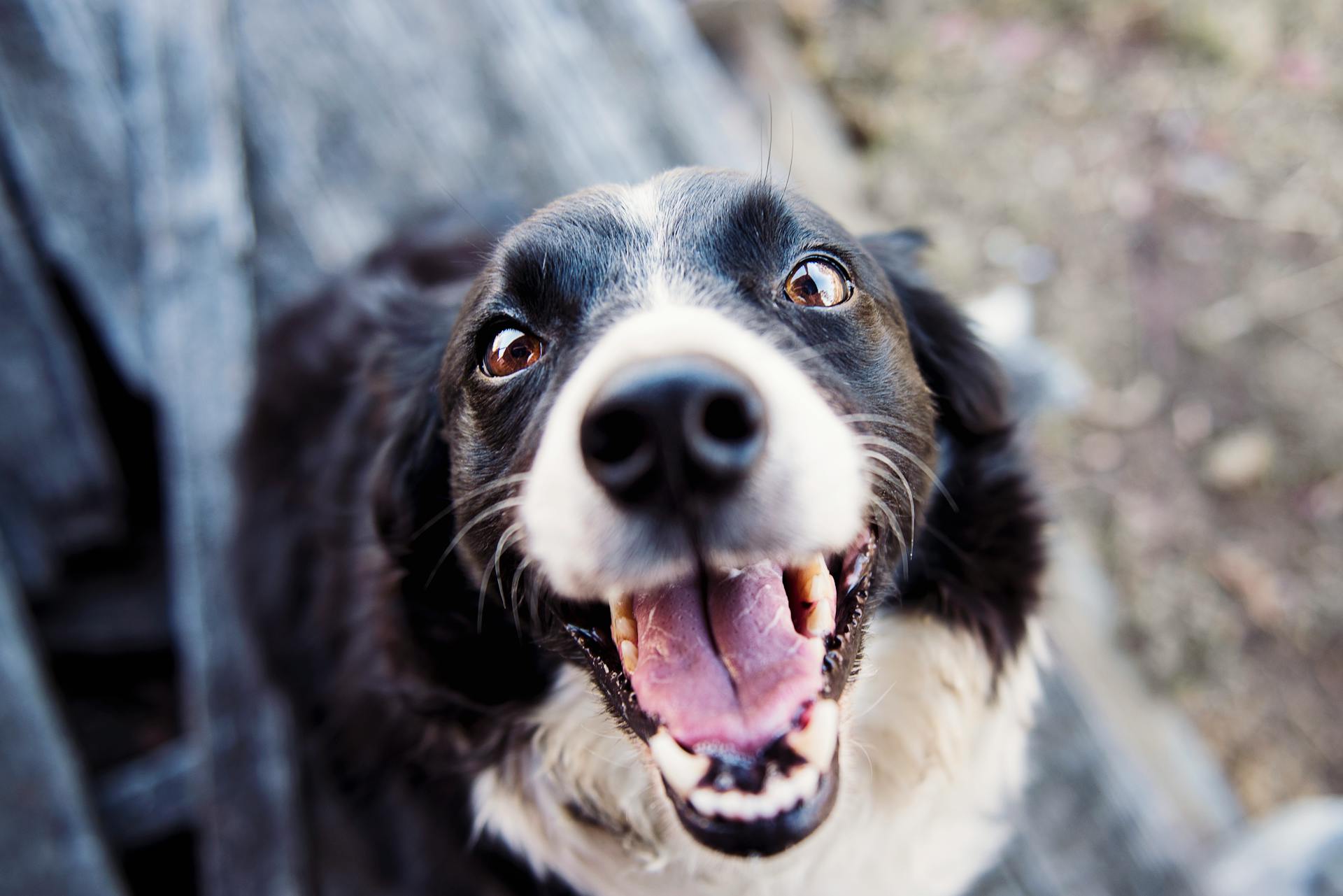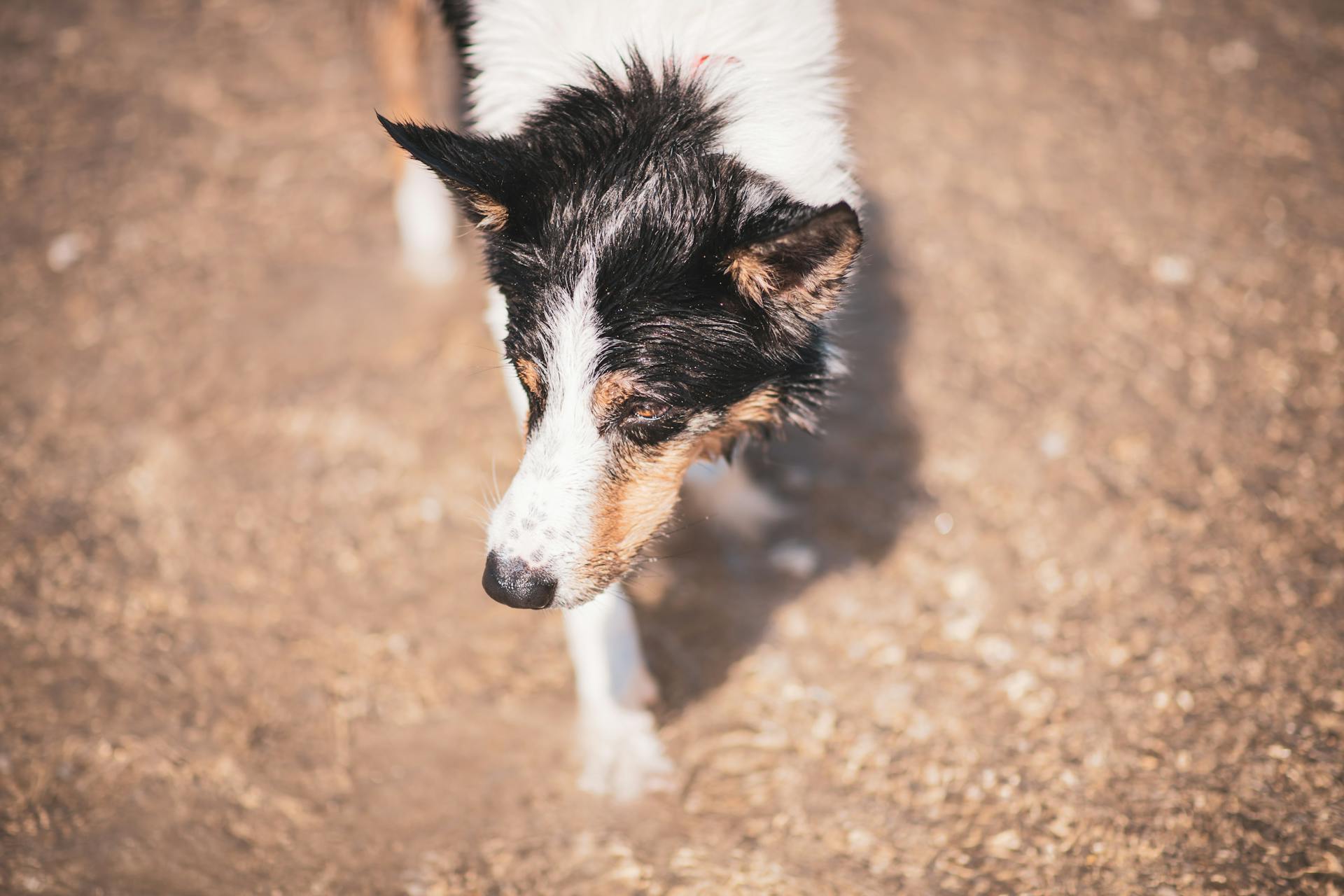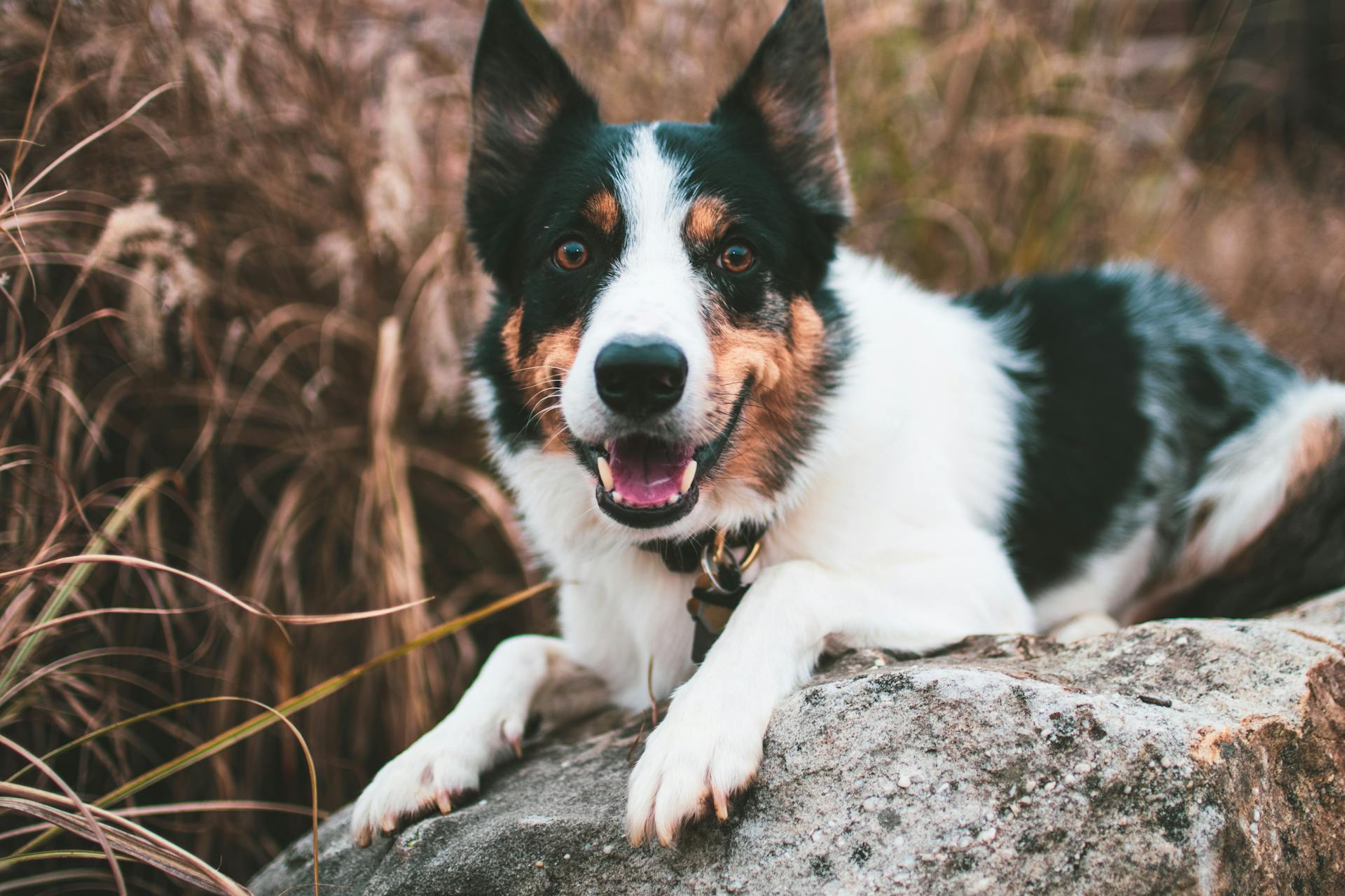
Border Collies are a popular breed, but they can be a handful for first-time pet owners. They require a lot of exercise and mental stimulation.
Border Collies are highly intelligent and trainable, but this also means they can be strong-willed and independent. They need an owner who can provide consistent training and boundaries.
In terms of exercise, Border Collies need at least 1-2 hours of physical activity per day, which can be challenging for first-time owners who may not have a lot of experience with dog care.
Explore further: How Much Exercise Do Border Collies Need
Supremely Intelligent
Border Collies are known for being supremely intelligent, with a highly developed instinct to work and learn. They respond extremely well to training, which is why they're often used as mountain-rescue or sniffer dogs.
Their intelligence is matched by their energy, making them quick both mentally and physically. In fact, they're considered one of the most intelligent and obedient breeds.
To put it bluntly, Border Collies need mental stimulation to prevent boredom and destructive behavior. If you're not able to devote plenty of time to training and engaging with your Border Collie, this breed may not be the best fit for your lifestyle.
Here are some key characteristics of a Border Collie's intelligence:
- Extremely intelligent and able to learn quickly
- Respond well to training, making them easy to train
- Require plenty of mental stimulation to prevent boredom and destructive behavior
Their high energy and intelligence make them a great fit for active, outdoorsy households where they can be part of the action.
Training and Exercise
Border Collies are a high-energy breed that requires plenty of exercises and mental stimulation to stay happy and healthy.
They are natural herders and love to run, jump, and play, so it's essential to provide them with daily physical activity and mental stimulation. This can include long walks, playtime, and interactive toys.
Border Collies are highly intelligent and respond well to positive reinforcement techniques, making them quick to pick up training. However, they can become disinterested and lose focus if training activities are boring or repetitive.
To keep your Border Collie engaged, introduce a wide range of different commands and activities, and avoid repeating the same ones. This will help maintain their interest and enthusiasm throughout their learning process.
Consistency is key when training a Border Collie, and short, consistent training sessions are better than long and sporadic ones. Aim for 10 minutes per day, and make sure to train around meal times to keep your dog motivated.
Here are some essential tips for training a Border Collie:
• Train around meal times to keep your dog motivated
• Use positive reinforcement techniques, such as praise and gentle taps on the back
• Introduce a wide range of different commands and activities
• Avoid repeating the same commands and activities
• Keep training sessions short and consistent
By following these tips and providing your Border Collie with plenty of exercise and mental stimulation, you can help them become a well-behaved and happy companion.
A different take: Are Border Collies Easy to Train
Grooming and Nutrition
Border Collies have a thick double coat to protect them from all weathers. This means they'll need regular grooming to prevent matting and tangling.
Their coat type can vary, but they're generally heavy shedders, especially during moulting seasons. You can expect to see a lot of hair around the house!
Additional reading: Short Hair Rough Collie
To keep your Border Collie's coat under control, aim to groom them at least once a week. They might not need trips to a professional groomer, but regular brushing will help prevent matting.
As for their diet, Border Collies are active dogs that need a high-calorie, good quality food. The main ingredient should be protein like chicken, duck, or fish.
Here's an interesting read: Do Border Collies Need to Be Groomed
Grooming
Grooming is an essential part of Border Collie care. They have a thick double coat to protect them in all weathers, which means regular grooming is necessary.
Border Collies commonly have black and white or red merle (tan and white) coats, and have two main coat types – smooth and rough.
Their amount of hair can vary, but they're generally agreed to be heavy shedders, especially during moulting seasons. This can be a challenge for some owners, but regular brushing can help manage the shedding.
Regardless of their coat type, your Border Collie will need to be groomed at least once a week. They rarely require trimming or trips to a professional groomer, but a weekly brush will help keep their coat in good condition.
Here are some key grooming tips for your Border Collie:
- Groom your Border Collie at least once a week.
- Brush them regularly to manage shedding.
- No need for frequent trimming or professional grooming.
Best Diet
Feeding your Border Collie the right diet is crucial for their overall health and well-being.
Adult Border Collies can reach a wide range of weights and sizes, so it's essential to ask for advice from your vet or breeder on the best food for your dog. Many recommend feeding a high-quality pet food twice a day.
Try to stick to the portion size guidelines on the back of the pet food packaging, as this can help ensure your dog has a long life span with the right diet and exercise.
A high-calorie, good quality diet is best for Border Collies, with the main ingredient being protein such as chicken, duck, beef or fish instead of grains or byproducts.
Border Collie puppies need around 1,000 calories a day, although this can vary depending on their age and other factors.
To avoid overfeeding your dog, be careful not to overdo it, as they can easily become overweight, especially as they get older.
Here are some general guidelines for feeding your Border Collie:
- Adults: Feed twice a day, sticking to portion size guidelines.
- Puppies: Feed three times a day, reducing to two meals a day when they become an adult.
Health
As a first-time dog owner, it's essential to consider the potential health issues that can affect your Border Collie.
Border Collies are generally a healthy breed, but they can be prone to certain health issues.
Hip dysplasia is a common condition that can affect Border Collies, causing arthritis and mobility problems.
Eye problems, such as Progressive Retinal Atrophy, can also occur, leading to vision loss.
Other potential health issues include Pannus, Hypothyroidism, Osteochondritis Dissecans, and Portosystemic Shunt.
Here are some specific health issues that can affect Border Collies:
- Hip Dysplasia
- Progressive Retinal Atrophy
- Pannus
- Hypothyroidism
- Osteochondritis Dissecans
- Portosystemic Shunt
It's worth noting that while these conditions can be a concern, many Border Collies live long and healthy lives with proper care and attention.
Training and Behavior
Border Collies are highly intelligent and responsive to training, picking up commands quickly with positive reinforcement techniques. They thrive on consistency and structure, so it's essential to establish a regular training routine.
To keep your Border Collie engaged, it's crucial to mix up training activities and avoid repetition. This will prevent boredom and maintain their interest in learning. Short and consistent training sessions are more effective than long and sporadic ones.
Border Collies need a lot of exercise and mental stimulation to prevent problem behavior. A minimum of 90 minutes of daily activity is recommended, including physical activities like running and playtime, as well as mental stimulation through puzzle toys and training.
If you're a first-time owner, it's essential to consider the needs of your Border Collie. They require a lot of attention and interaction, so be prepared to spend time with them and engage in activities they enjoy.
Here are some tips for training your Border Collie:
- Use positive reinforcement techniques, such as treats and praise, to encourage good behavior.
- Establish a regular training routine to keep your Border Collie engaged and prevent boredom.
- Provide plenty of exercise and mental stimulation to prevent problem behavior.
- Be consistent and patient, as Border Collies can be challenging to train if they become disinterested or confused.
By following these tips and being aware of the needs of your Border Collie, you can establish a strong and loving relationship with your pet.
Thrive on Routine
Border Collies thrive on routine and consistency, and can become stressed or anxious if their routine is disrupted. This means establishing a regular routine for your Border Collie, including feeding times, exercise times, and playtime, to help them feel secure and happy in their home.
Socialization is also crucial for Border Collies, but it's essential to remember that they require a lot of interaction and mental stimulation to prevent boredom and destructive behavior. If you're not able to provide your Border Collie with plenty of opportunities for socialization, this breed may not be the best fit for your lifestyle.
Having a consistent routine can help prevent unwanted behaviors like chewing or digging, which can be a nightmare to deal with. By establishing a regular schedule, you can help your Border Collie feel more secure and happy in their home.
A well-planned routine can also help you manage your Border Collie's energy levels and prevent over-exertion. This is especially important for high-energy breeds like Border Collies, which require regular exercise and mental stimulation to stay happy and healthy.
Consider reading: Are Border Collies High Energy
Breed Overview
Border Collies are highly active, alert, and eager to have a purpose, making them a perfect breed for those who are active and committed to providing their canine pal with a stimulating lifestyle.
They're incredibly trainable, which is great news for first-time owners who are willing to put in the effort to teach them new things. Their intelligence is off the charts, ranking them among the most intelligent breeds out there.
Border Collies have an average lifespan of 10 to 15 years, which is relatively long for a medium-sized dog. Some have even been known to live up to 18 years with proper care and attention.
If you're considering bringing a Border Collie into your life, be prepared to provide daily physical and mental stimulation – they'll enjoy activities that challenge them and like to have a job to do. Without exercise, they can become destructive in the household.
Breed Overview
Border Collies are highly active dogs bred for sheep herding, which means they have a strong instinct to work and need regular exercise to stay happy and healthy.
Their intelligence and trainability make them a perfect breed for active owners who can provide a stimulating lifestyle.

Border Collies typically live for 10 to 15 years, although some have been known to live up to 18 years with proper care.
You can rescue a Border Collie from a shelter and give it a forever home for around $250 to $600.
If you're set on buying a puppy from a reputable breeder, be prepared to pay up to $2,000, or even $3,500 for a pup from a show dog bloodline.
On a similar theme: Pembroke Corgi Life Expectancy
Breed History
The Border Collie's breed history is a fascinating tale that spans centuries. The breed originated in Northumberland, which borders England and Scotland, and its name comes from this Anglo-Scottish border region.
The breed's history dates back to the first century B.C., when the Romans invaded England and brought their herding dogs with them. These dogs were later cross-bred with a small Spitz-like herding dog brought by Viking raiders.
Old Hemp, a highly intelligent and agile canine, is considered the ancestor of all modern Border Collies. He was a local favorite among shepherds, known for his exceptional herding skills.
Take a look at this: Shetland Sheepdog History
Old Hemp won the first official sheepdog trial in Bala, Wales, in 1884, using a unique method of staring down the sheep instead of nipping or barking at them. This method proved to be a success, and it's still used by many Border Collies today.
The Border Collie was officially recognized by the AKC in 1995, after being known as the Sheepdog until 1915.
Frequently Asked Questions
Is it hard owning a Border Collie?
Owning a Border Collie can be challenging if you're not prepared to provide consistent attention and mental stimulation. With proper care and attention, however, they can be a loving and rewarding companion.
Is a Border Collie a good house dog?
Border Collies are best suited for active families with outdoor space, as they require regular exercise to thrive. They can make great family pets, but a house with a large garden is essential for their happiness and well-being.
Sources
- https://www.petplan.co.uk/pet-information/dog/breed/border-collie/
- https://wagwalking.com/breed/border-collie
- https://www.oneminddogs.com/blog/how-to-train-your-border-collie-5-key-steps/
- https://perfectpetzzz.com/are-border-collies-easy-to-train-here-are-10-tips-for-training-the-smartest-dog-breed/
- https://iheartdogs.com/13-things-to-know-before-bringing-home-a-new-border-collie/
Featured Images: pexels.com


